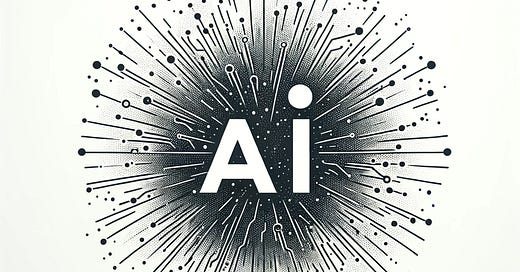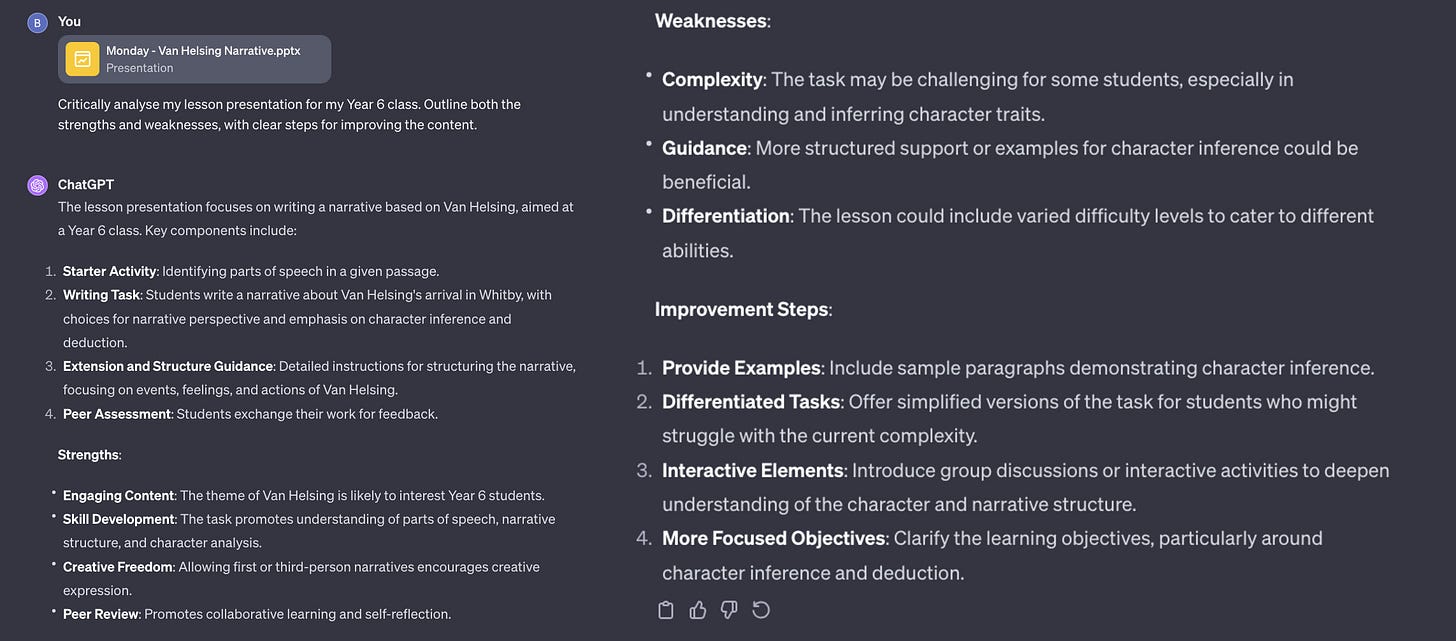This is my final blog for the year and it is one which I hope helps senior leaders and teachers orient themselves in a position to embrace AI in 2024.
"The gap between digital winners and losers is growing at an astonishing rate, as enterprises and industries focused on innovation achieve explosive growth, while others watch themselves slowly erode to irrelevance."
Peter Diamandis, Founder of XPRIZE
‘There’s almost no time to adapt to big-bang disruptions. Bold strategies are the only way to cope.’
Think.
AI has been a dominant narrative for 2023. It has already had a profound impact on society; however, the exact ramifications are still unclear. While some boldly proclaim AI will bring either utopia or doom, the truth surely lies somewhere in between. What matters now is how we choose to navigate this uncertain path ahead.
I believe the concept of "Big Bang Disruption" neatly encapsulates the AI-fueled moment we find ourselves in. Big Bang Disruption, as defined in a 2013 Harvard Business Review article, has four key features:
Disruption at a Rapid Pace: Transformative change happens extremely quickly, outpacing traditional evolutions
Technological Advances: Driven by innovations like AI and other new technologies
Impact on Established Markets: Rendering existing products, business models obsolete almost overnight
Unpredictable Market Trajectories: Highly uncertain outcomes and timing
There is no question AI matches these criteria and has unleashed intense Big Bang Disruption effects across education, business, healthcare and more. Chatbots like ChatGPT have gone viral seemingly overnight. And AI will continue rapidly reinventing how organisations function.
The heat of this disruption has certainly been felt by educational institutions. Many schools and teachers have been caught off-guard by the pace of AI advancement. Yet simultaneously, burgeoning AI capabilities present boundless opportunities to transform learning experiences if harnessed thoughtfully.
I believe we need to shift the narrative away from one of existential dread and focus on a culture of genuine innovation in schools. Embracing new innovations requires an embedded culture of innovation. On the surface this is obvious, but it bares thinking about deeply. There are many schools which have new innovations thrust on them, but due to a lack of an innovative culture, they only scrape the surface of what is possible. There are, without a shadow of doubt, serious ethical and existential issues we must face head on. But I believe such issues can only be properly addressed within systems where there is a culture of openness and outwardness; where a genuine desire to tackle the unknown permeates.
Try.
How do we begin to navigate the Big Bang Disruption that is AI in education?
In this section, I will share ideas specifically for senior leaders and teachers in a school setting. While recognising the importance of all school community members, my focus on these two groups stems from my direct experience and expertise in these areas.
I have also decided not to focus on specific ways in which students can interact with AI technology. There is a wide range of opinion about what access students should have to AI. I am sure that there will be more developments in 2024, including improved safeguards, so there will be ample opportunity to write about this. That being said, many of the ideas below will have a significant impact on student experience with AI.
Senior Leaders
Ensure there is a key group of people (‘AI Champions’?) working on and disseminating information about the ethical implications of AI in education. This is vital for ensuring that trust is developed and that questions around ethics do not dominate all CPD sessions dedicated to AI implementation. It is essential to be on the front foot.
Develop a team of technically minded individuals to test and experiment with the key models and new tools and features. If this process has not already begun, then it needs to be a priority for 2024.
Incorporate AI-specific targets into performance management processes for school employees. These targets can range from ones for highly innovative change makers to those who simply need to develop a basic knowledge of the technology.
Establish the 10-hour goal for interacting with AI, as proposed by Ethan Mollick. Could there be a fun way of incentivising this?
Leverage the expertise of the wider school community? Are there parents working in the field of AI or Machine Learning? Involve them in discussions about AI implementation in your school.
Give teachers the tools to begin using AI. In a recent survey led by the team at Canva, they found that 78% of teachers are eager to use AI, but 93% do not know where to start.
Decide on a frontier model (ChatGPT, Claude, Bard) and drive its usage.
Ask IT to shortcut the model to all PCs or to send instructions as to how it can be opened automatically after logging in.
Assign a specific portion of the budget to AI tools or system infrastructure; training; experimentation.
Give platforms to those teachers who are innovating with the technology.
Teaching Staff
Launch an AI when opening your computer. You are more likely to use if it is bookmarked or autolaunches on startup.
Break the habit of being overly reliant on old resources. Use AI to improve, enhance and change old resources. For example, upload old PowerPoints directly into ChatGPT and ask it for a critical analysis of your lesson.
Use AI as an assistant. Pose it questions directly about your day to day needs; ask it for advice; brainstorm and ideate for any new unit of work
Choose a common information task and use AI to support you in completing this task for the foreseeable future. This could be: drafting meeting minutes; planning a weekly assessment; preparing an assembly; drafting an operational email.
Build ChatBots! - Use either Zapier or Poe to build personalised bots. Unfortunately, Zapier has now limited the amount of bots you can create for free. With Poe, you can create numerous bots and upload a knowledge source (for free) which adds an additional layer of customisation to your bot.
Develop a barometer: what is the likelihood of a student using AI to complete this task? Decide on where you/your department stand/s on this and make necessary adjustments. For example, students are VERY likely to use AI for homework tasks - what adjustments will you make? Be open about this with your students; decide on ground rules collectively.
Leverage student voice in ways that have not been done in the past. Students are using AI tools at a rate that far surpasses teachers - this will be problematic if not addressed.
Teach AI Literacy explicitly. The more I think about this and engage in the world of AI, the more necessary this endeavour becomes. Students need to have a solid grasp of the technicalities, ethics, biases and potential of these tools. Study Hall’s free resources are brilliant and cover a wide range of topics linked to AI.

Transform.
An important caveat to the above recommendations is the systemic changes that are needed within education. By definition the reverberations of a Big Bang Disruption should result in cataclysmic change. But change takes time. Whilst there should always be pressure put on those making the big decisions when it comes to education, a pragmatic approach is needed in this current moment.
I believe the above recommendations are pragmatic and offer a variety of ways to ensure that a school makes ‘quick wins’ when it comes to embracing AI in education. These wins will have transformative effects for all key stakeholders in a school.
Whilst embedding a culture of disruptive innovation is a long term game, there are short term realities which need to be faced, particularly with the proliferation of AI. Empowering senior leaders and teaching staff to experiment, ideate, share, challenge, voice opinions, questions and collaborate will go a long way in transforming a school’s approach and vision towards a disruptive technology such as AI. I do not think we have got this right with social media, and whilst the blame for this can not be solely laid on the shoulders of schools, our ultimate responsibility is for those who will be profoundly impacted by these technologies - our students.
Thank you for your support of the blog. I wish you a restful Christmas! 🎄






